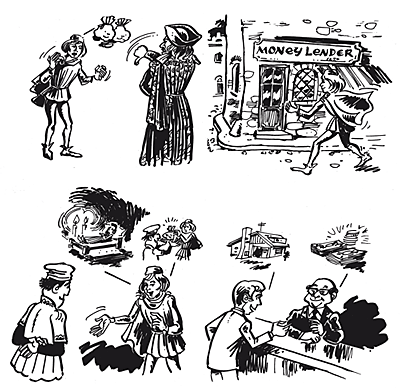mort-, mor-, mori-, morti- +
(Latin: death, dead; die, dying)
From Publilius Syrus, Sententiae (c.43 B.C.).
2. Having lost all sense of purpose or vitality.
3. Becoming obsolescent.
As Dr. Blank concluded his lecture, a woman rushed up to him. "Doctor," she said, "I've wanted to shake your hand and thank you ever since you saved my life two years ago."
"When was that?" asked the doctor politely, taking her hand and trying to remember her face.
"I was in the hospital and they had all given me up," explained the woman. "No one seemed to know what was the matter with me. Then one day you came into my room with some other doctors, took just one look at me and diagnosed my case instantly. I began getting well from that hour, and you can see I'm perfectly all right now."
"That's very interesting," said the doctor, still lost at sea. "I diagnosed your case with one look? What did I say?"
"It's funny, but I can't remember the exact word. It began with an 'm' and was three syllables. I meant to look it up, but I never did."
The doctor thought a moment. "Was it 'moribund'?"
"Yes," cried the woman delightedly. "And I began to improve the moment you said it!"
2. Someone, or something, which is close to extinction or of being stagnant.
2. On the verge of becoming obsolete or of no longer performing effectively or usefully.
2. Concerning great intensity or anxiety: Little Timmy showed mortal fear of the large snake that suddenly appeared in the garden.
3. Regarding something possible or conceivable: Mary's father did every mortal and feasible thing to make his daughter happy while she was in hospital following the car accident.
4. Pertaining to something that causes death; fatal: During the war, there were many soldiers who died because of mortal wounds.l
"Death Speaks"
There was a merchant in Baghdad who sent his servant to market to buy provisions and in a little while the servant came back, white and trembling, and said, "Master, just now when I was in the market place I was jostled by a woman in the crowd and when I turned I saw it was Death that jostled me. She looked at me and made a threatening gesture; now, lend me your horse, and I will ride away from this city and avoid my fate. I will go on to Samarra and there Death will not find me."
The merchant lent him his horse, and the servant mounted it, and he dug his spurs in its flanks and as fast as the horse could gallop he went.
Then the merchant went down to the market-place and he saw me standing in the crowd and he came to me and said, "Why did you make a threatening gesture to my servant when you saw him this morning?"
"That was not a threatening gesture," I said, "it was only a start of surprise. I was astonished to see him in Baghdad, for I had an appointment with him tonight in Samarra."
2. A personal enemy.
2. A sin; such as, murder or blasphemy, that is so heinous it deprives the soul of sanctifying grace and causes damnation if unpardoned at the time of death.
3. A willfully committed, serious transgression against the law of God, depriving the soul of divine grace.
Theologians have listed seven mortal sins, including: perjury, adultery, lust, murder, contraceptive use, and abortion.
2. The mortality or death rate.
3. In life insurance, the ratio of actual deaths to expected deaths.
4. Frequency in the number of deaths in proportion to a population.
Whereon each one of us may write
His word or two, and then comes night.
2. Historically, when the oldest son of a nobleman needed large sums of money which his father refused to give him, he often turned to borrowing.
In arranging the loan, he would gage or “pledge” to repay the debt when his father died (at which time the son expected to receive his inheritance).
So it is that mortgage originally meant a pledge to repay upon the death of one’s father. Now the word is used when someone pledges property as a guarantee; such as, a house, to a creditor as security or a guarantee for the repayment of a loan or other debt; as shown in the illustration below.



